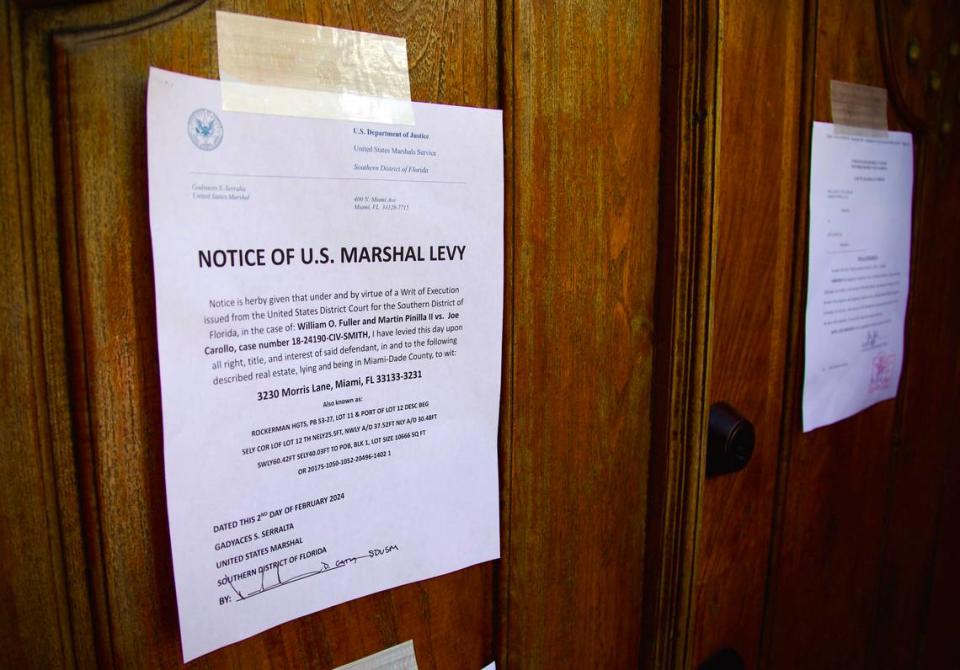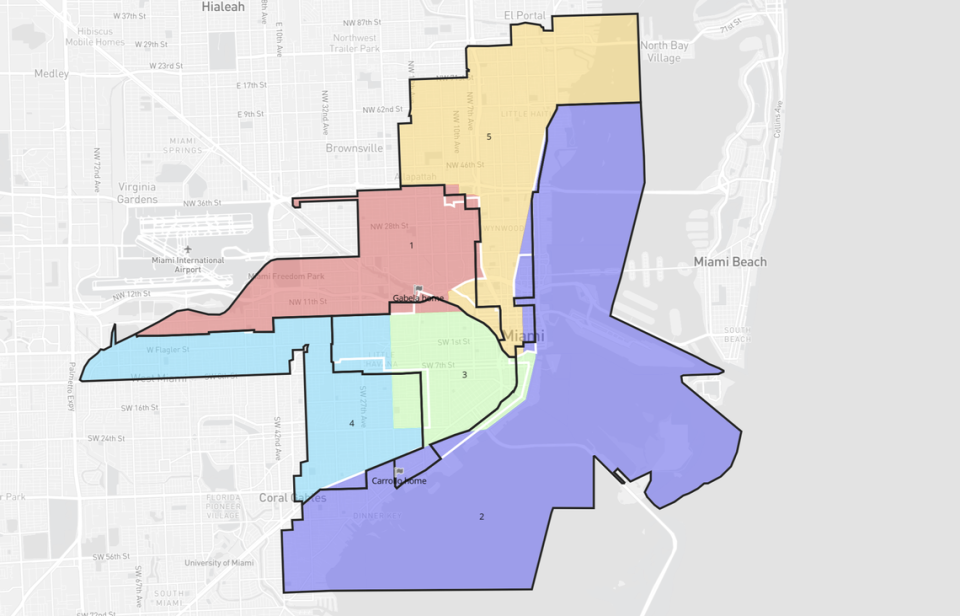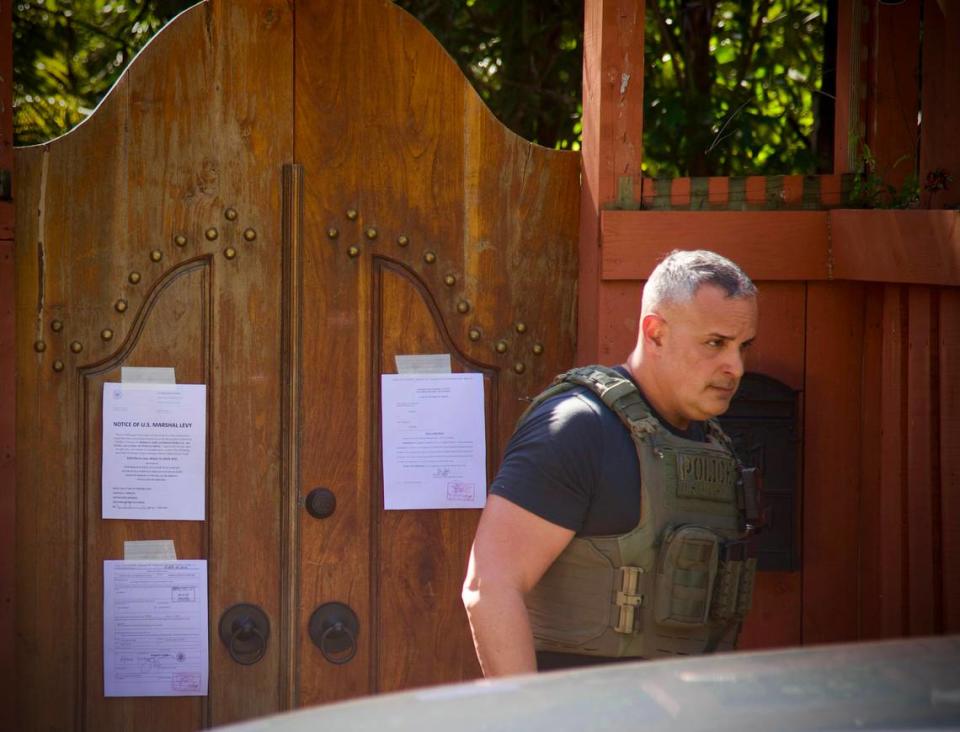Ball & Chain lawyers say Miami districts were altered to protect Carollo’s home from seizure
Miami City Commissioner Joe Carollo took the stand in federal court Friday morning to answer questions about whether he manipulated the city’s voting map in order to protect his Coconut Grove home from being seized to satisfy part of a multimillion-dollar judgment against him.
Details presented in Friday’s evidentiary hearing added to the Venn diagram between the dispute over the city’s voting map and the ongoing litigation between Carollo and two Little Havana men who accuse the District 3 commissioner of leading a harassment campaign against their businesses. Last year, a jury awarded those businessmen, Bill Fuller and Martin Pinilla, a $63.5 million judgment in the first of their lawsuits.
In an effort to collect on the judgment, the U.S. Marshals in February began the process of seizing Carollo’s home — his largest asset. “That’s basically all that I have,” he said Friday.

Carollo’s lawyers have argued that his Morris Lane home is his legal homestead under a state constitutional provision that protects such properties from being seized to pay a legal judgment. The principle is separate from the homestead exemption that lowers the property taxes people have to pay on owner-occupied homes.
Carollo moved out of the home in 2016 when he ran for office in District 3 because, at the time, the home was located in District 2. On Friday, his attorneys pointed to evidence — including the commissioner’s tax returns, driver’s license and DirecTV account — to show that he moved back into the Coconut Grove home in April of 2023, days before the Fuller and Pinilla trial began.
Carollo’s home was originally slated for an auction in March. But a judge previously agreed to delay it until the courts resolve the question of whether Carollo and his wife, Marjorie, have constitutional protection. Weeks after U.S. Marshals began the process of seizing the home in early February, the Carollos filed affidavits with Miami-Dade County, claiming their home is their legal homestead under the Florida Constitution.
Fuller and Pinilla’s attorneys argue that the homestead exemption does not apply to Carollo because of his “fraudulent and egregious manipulating” of the city’s voting maps.
The first version of a voting map that the City Commission considered during the redistricting process in 2022 kept Carollo’s Coconut Grove home in District 2. But a subsequent version of the map brought his home into District 3. The commission approved that map 3-2, with Carollo as the swing vote.
The plaintiffs contend in a recent filing that Carollo’s actions in the redistricting matter were “aimed solely and exclusively at putting him in a position [to] move back into a property on Morris Lane that he had abandoned years earlier with the sole purpose of protecting that property from judgment creditors.”

Miguel De Grandy, who was hired by the city as a redistricting consultant in 2021, was also called to the stand on Friday. He said that, while he never discussed asset protection with Carollo during the redistricting process, he did take into consideration Carollo’s desire to be in District 3, though he said that Carollo never instructed him to draw the Morris Lane home into the district.
De Grandy said he sought to get a consensus vote from the commission on the new district map.
“I said I thought it would make him happy, yes,” De Grandy said Friday, referring to prior testimony he gave about adding Carollo’s home to District 3.
Carollo testified that it wasn’t a conflict for him to vote on the map in 2022 that added his home into District 3 because, at that point in time, he didn’t anticipate moving back to Morris Lane in the near future.
“I didn’t have a crystal ball before me,” Carollo said, adding that other factors, including mold and cracking walls, pushed him and his wife to leave their Little Havana rental and move back to the Coconut Grove home when they did.
Former District 2 City Commissioner Ken Russell, who served alongside Carollo, was also called to the stand.
Asked if drawing Carollo’s home into District 3 served a legitimate purpose, Russell said “none whatsoever.”
“There was no legitimate purpose,” he said, adding that he and his city staff frequently discussed how Carollo’s house “was being protected in this process.”

After a federal judge ruled earlier this year that the city had racially gerrymandered its 2022 voting map, the city reached a tentative settlement with the American Civil Liberties Union, which represents the voting rights activists who sued the city. The proposed new map drew Carollo’s home out of District 3, reuniting all of Coconut Grove in District 2. Commissioners agreed to the settlement terms in a shade meeting, according to Chairwoman Christine King.
But when the settlement went before the commission for final approval at last week’s meeting, Carollo led the charge to defer the vote. Carollo asked for the deferral in part because of the absence of Commissioner Damian Pardo, despite the fact that Pardo had previously expressed support for the settlement agreement.
Jeffrey Gutchess, an attorney for Fuller and Pinilla, said Friday that the deferral was a strategic move by Carollo so he could come to Friday’s hearing with his home still in District 3.
But Mason Pertnoy, an attorney for Carollo, called the plaintiffs’ overarching argument a “red herring,” saying they seek to “render meaningless” the state’s constitutional homestead protection shielding Carollo’s home from seizure.
The fate of Carollo’s home is still up in the air. U.S. Magistrate Judge Lauren F. Louis, who oversaw Friday’s evidentiary hearing, plans to later forward her recommendation to U.S. District Court Judge Rodney Smith, who oversaw the federal lawsuit that resulted in the $63.5 million judgment.
Miami Herald Associate Editor Joey Flechas contributed reporting.

